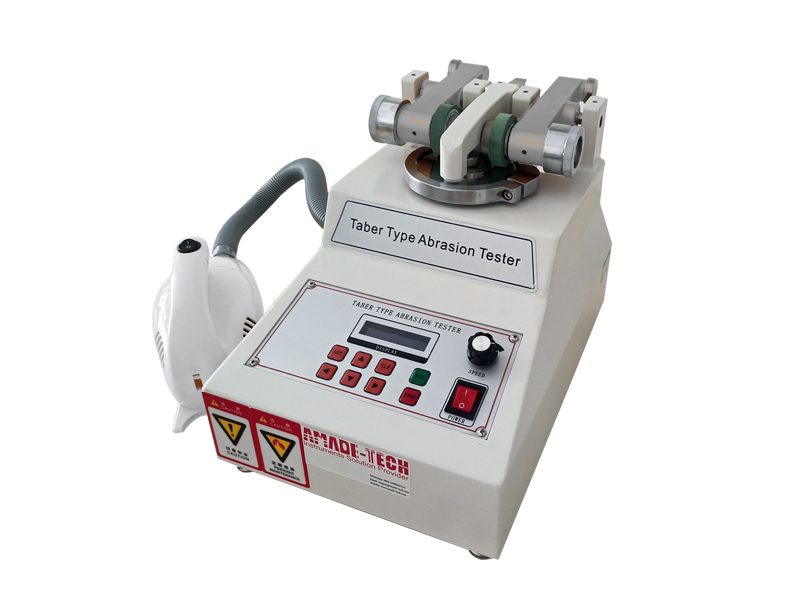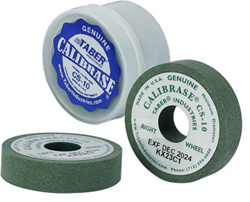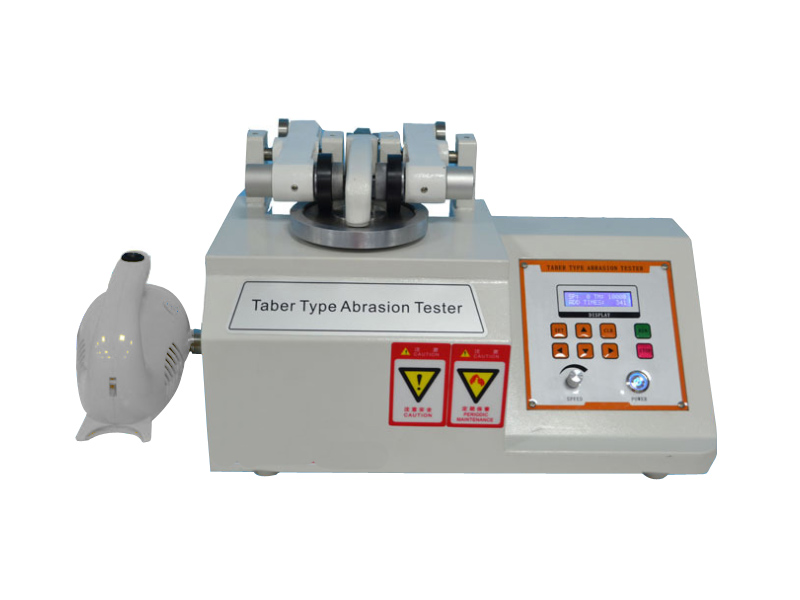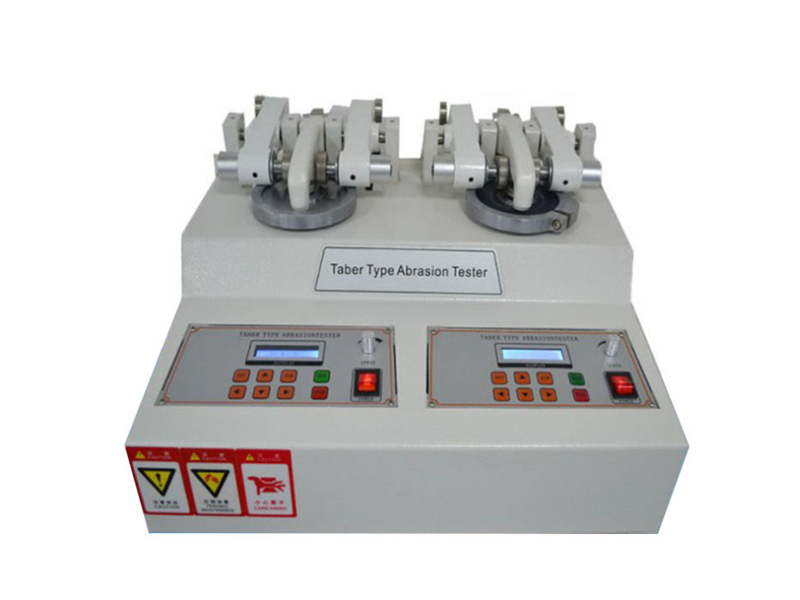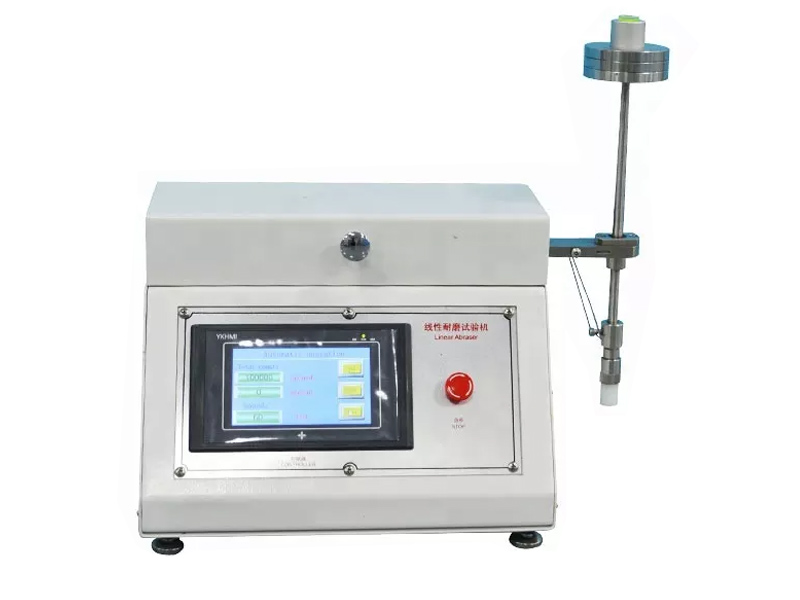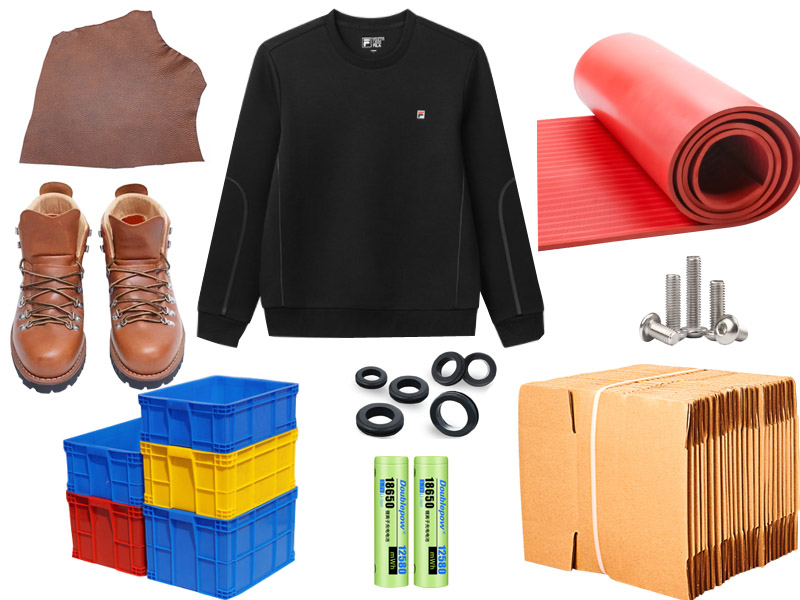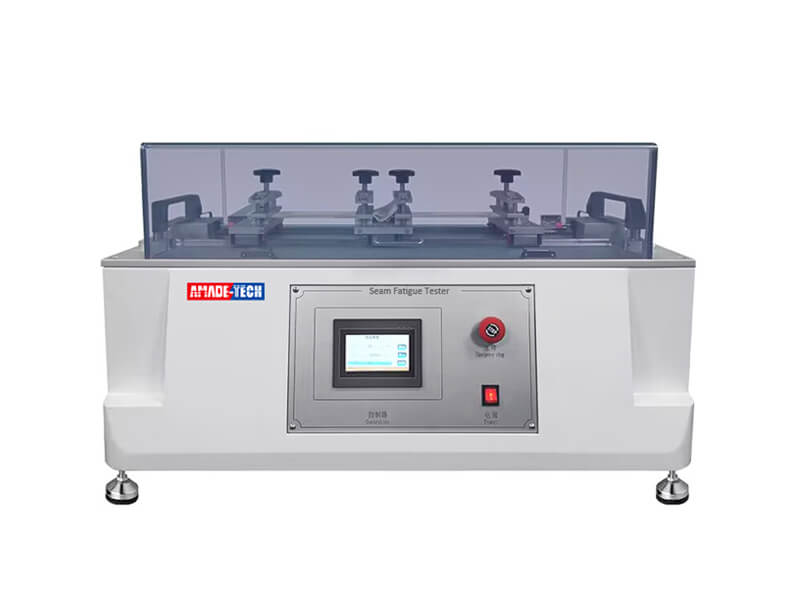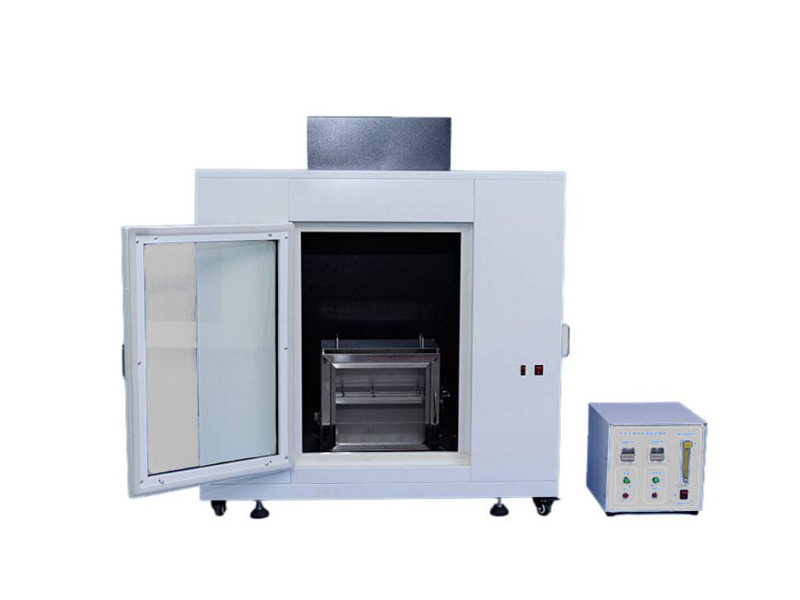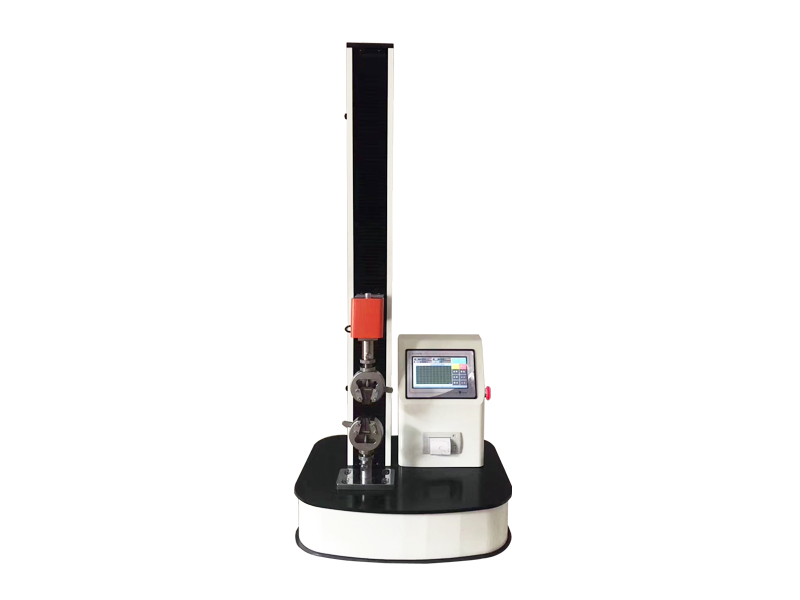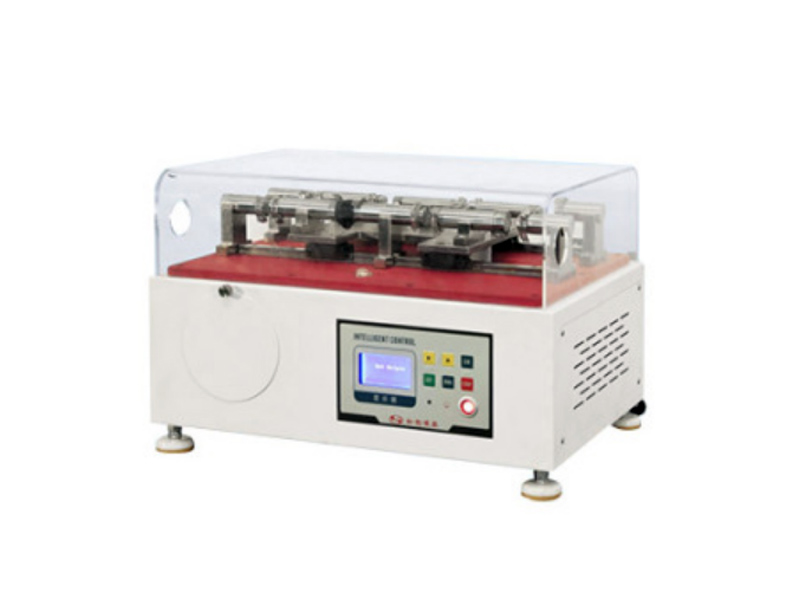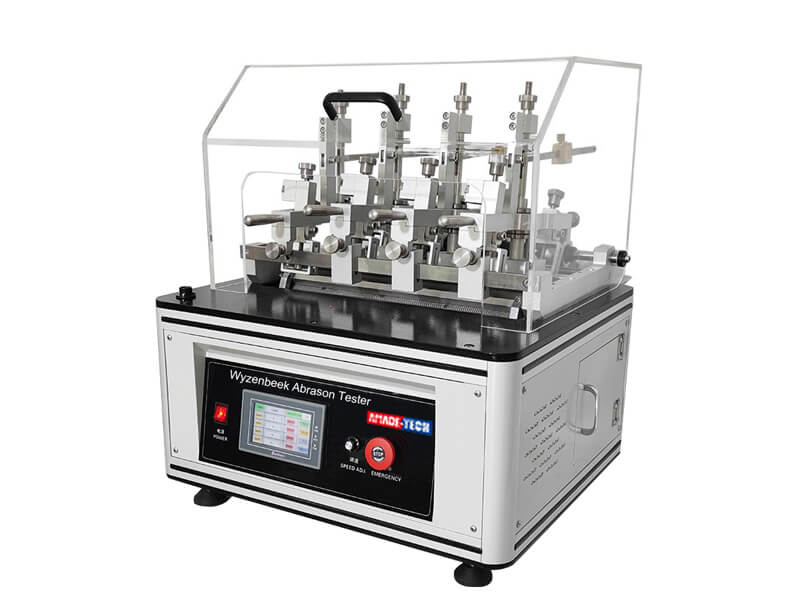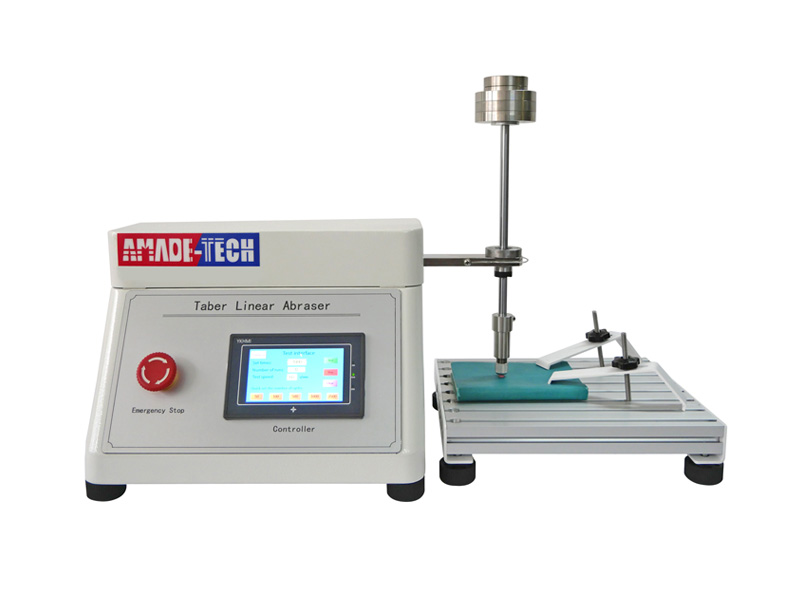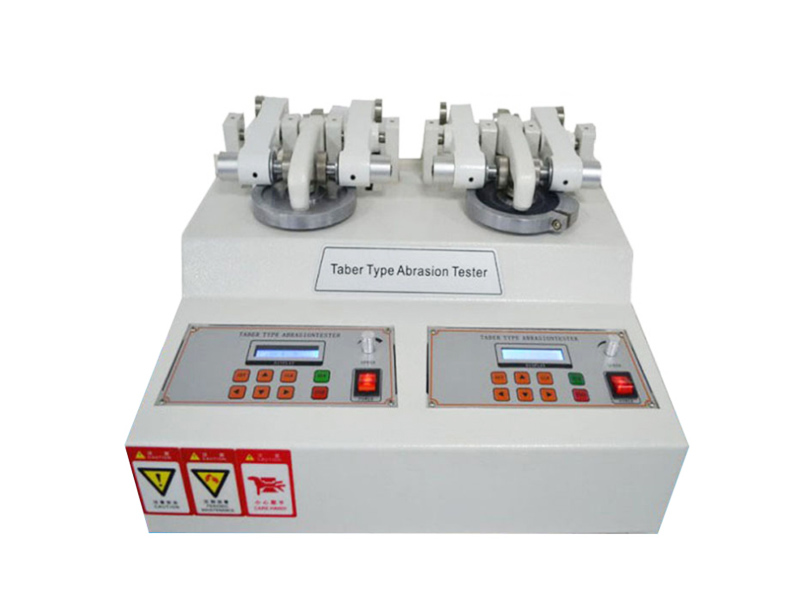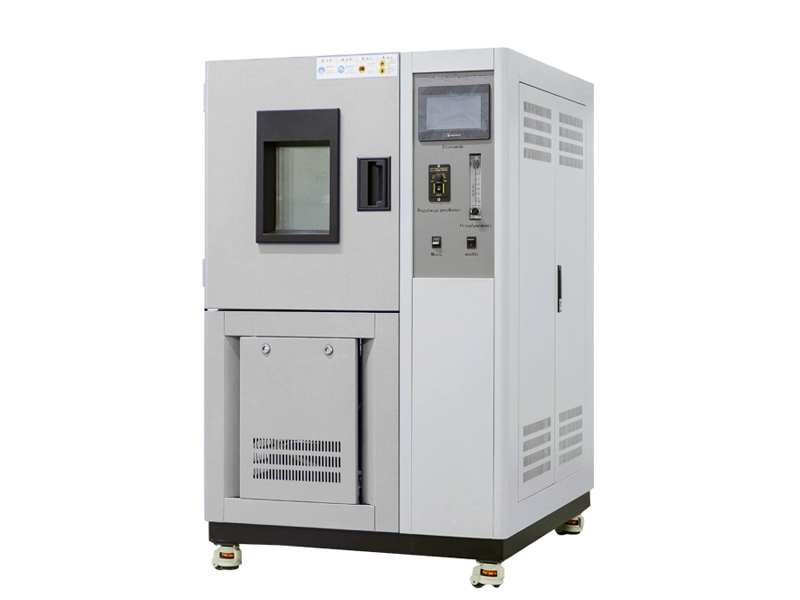Taber Abraser | Taber Abrader China Manufacturer
Taber Abrasion Tester is also referred to as Taber abraser or Taber abrader, which is used to evaluate the wear resistance of materials or finished products.
The machine features a rotary platform, allowing two abrading wheels to slide against the test piece at a constant speed.
This single platform Taber Abrasion Tester owns an elaborate design and adopts a precise drive system and a transmission device to ensure it runs smoothly, reliably and with low noise during use, providing a reliable and comfortable testing experience.
It is widely applicable to the determination of abrasion resistance of the leather, fabrics, textiles, coatings, paint, glass, ceramics, paper, high-pressure decorative laminates, natural rubbers, plastics, etc.
Test Principle of Taber Abrasion Tester
A test piece is mounted to the round turnplate (as a specimen holder) with rotation function under control. Two abrasive wheels attached to the free ends of pivoted arms rub against the specimen under the given downward pressure. Driven by the turntable, one abrading wheel grinds the test piece inward toward the center, and the other one rubs the test piece outward toward the periphery. Abrasion resistance is assessed by an average rate of loss in mass / volume of the specimen or the number of cycles to the end-point.
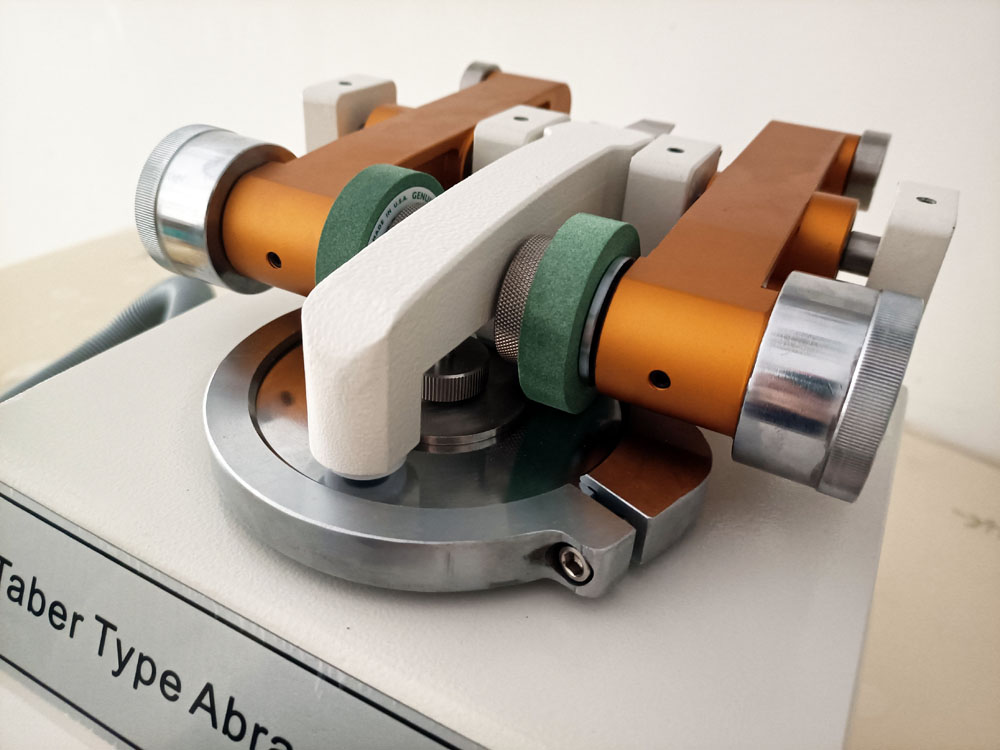
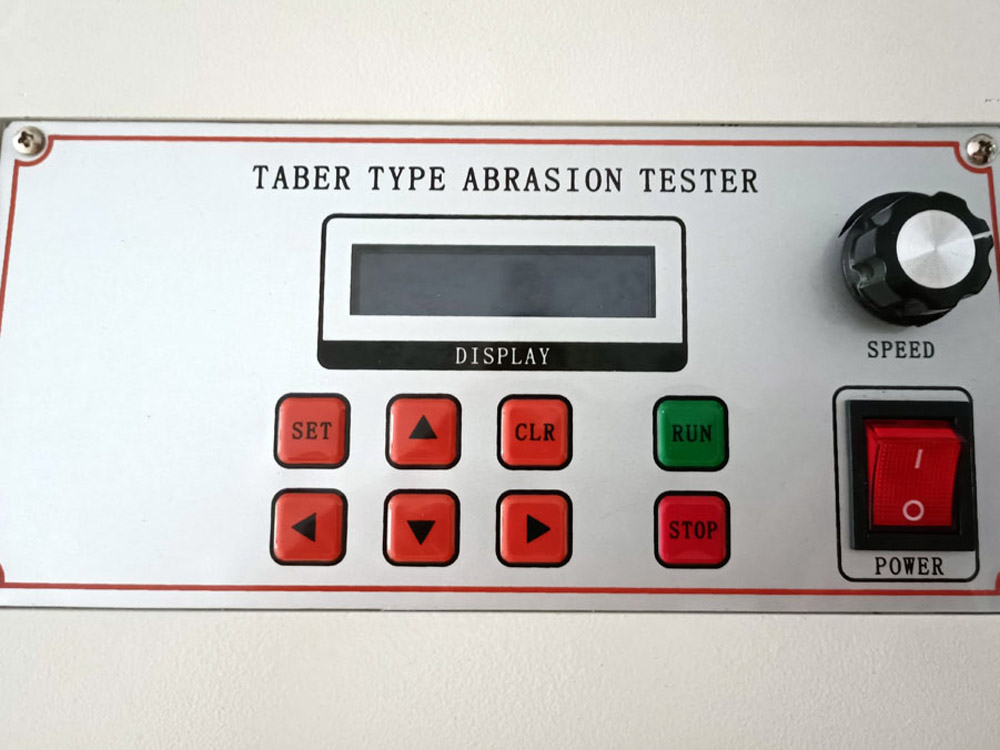
Test Standards
- ASTM D3884 Abrasion resistance of textile fabrics(Rotary platform, double-head method)
- ASTM D1175 Method of abrasion resistance of textile fabrics
- ASTM D1044 Test method for resistance of transparent plastics to surface abrasion
- ASTM D4060 Abrasion resistance of organic coatings by the Taber
- TAPPI T476 Abrasion loss of paper and paperboard(Taber type method)
- ISO 9352 Plastics determination of resistance to wear by abrasive wheels
- ISO 5470-1 Rubber or plastic coated fabrics determination of abrasion resistance-part1 taber abrader
- JIS K7204 Plastics-determination of resistance to wear by abrasive wheels
- JIS A1453 Abrasion test method of building materials and building components (sand paper method)
- JIS K6902 Testing method for laminated thermosetting high-pressure decoration
- JIS L1096 Testing methods for woven and knitted fabrics
- DIN 52347 Testing of glass and plastics, abrasion test, method using abrasion wheels and measurement of scattered light
- DIN 53109 Testing of paper and board-determination of abrasion by the abrasion wheel method
- DIN 53754 Testing of plastics, determination of abrasion, abrasive disk method
- DIN 53799 Decorative laminated sheets on basis of aminoplastic resins test method
- ISO 17076-1 Leather determination of abrasion resistance part1-taber method
Main Technical Parameters
| Model | AT-L9001 |
| Abrading Wheel’s Dimension | Outer dia.: 51.9 mm (Max.: 52 mm), Thickness: 12.7 mm |
| Center hole’s Diameter | 6.35 mm |
| Rotating Speed | 60 rpm / 72 rpm / adjustable |
| Distance Between the Inside Faces of Abrasive Wheels | 52.4 mm |
| Additional Loads | 250 g × 2 pcs
500 g × 2 pcs 750 g × 2 pcs |
| Counter | 0 ~ 999,999 cycles |
| Dimension | 90 cm × 70 cm × 42 cm |
| Weight | About 60 kg |
| Power Supply | 1∮, AC 220 V, 50Hz / AC 110 V, 60 Hz |
| Standard Configurations | Taber Abraser 1 set
Vacuum machine 1 set 250 g Weight 2 pcs 500 g Weight 2 pcs 750 g Weight 2 pcs Abrading wheel CS-10 or CS-17 1 pair or Specified S-11 Sandpaper 5 pcs Paster 3 pcs Power line 1 pc Hex wrench 1 pc |
| Suggestion on selecting abrading wheels | For coatings: CS-10, CS-17
For Plastics: CS-17, H-18, H-22 For high-pressure decorative laminates: CS-32, CS-33 For textile fabrics: H-18, H-22 (For more, please check them in FAQ “how to choose the right abrading wheels” at the bottom of this page)
|
Taber Rotary Abraser Features
- Made of precision steel, and the housing is processed by remarkable craftsmanship for rust protection.
- The weight of abrading arm is 250 grams, and additional weights of 250g, 500g and 750g are included for exerting total downward force of 500g, 750g and 1000g on the specimen If necessary.
- The platform’s revolution speed is adjustable: 60 rpm / 72 rpm or adjustable
- A vacuum cleaner is included to collect debris falled off from the specimen throughout the test.
- The height of the suction nozzles from the plane of specimen is adjustable according to the thickness of the test piece.
- A distinct control panel and operating system on the Taber abrader bring excellent usability.
- All accessories and consumables are gainable from Amadetech anytime.
- Original abrasive wheels and refacing sandpaper are included in the quote based on the different test standards and test objects.
- The custom Taber machine with two test stations is available.
FAQs
Taber abrasion test is a test method to evaluate the abrasion resistance of materials, which is to simulate whether the material can withstand repeated friction under set conditions. The test method is that a specimen rotating at a fixed speed is pressed against a pair of abrading wheels, and the specified load is applied to the specimen. When the turntable rotates, the abrasion wheel is driven to rub the specimen. The mass loss caused by abrasion is the difference in the mass of the specimen before and after the test. Taber abrasion test is one of many abrasion test methods. The word “Taber” comes from the name of the company that invented this machine.
Taber Abrasion Testing Machine can almost be called a versatile device. It is widely applicable to the determination of abrasion resistance of the leather, fabrics, textiles, coatings, paints, varnishes, carpets, ceramics, porcelain enamels, wood, furniture, paper, high-pressure decorative laminates, glass, rubber, plastic, luggage, anodized aluminum, deck and floor coverings, synthetic turf, etc.
Taber Type Abrasion Tester plays a vital role in evaluating the wear-resisting property of the materials and products. For some special purpose products in the industrial field, the ability of raw materials to resist wear is a crucial property that manufacturers have to focus on, as it directly impacts the quality of finished products. Taber abraser can determine this property within a short time in the laboratory to attain a relatively reliable result.
Amade is able to supply different types of Taber Abraser. If you are looking for a Taber abrasion tester for sale, please feel free to reach Amade for more details.
We know that Taber Abraser is widely used and can meet dozens of different test standards. The products in each test standard are different, and different products are required to use different types of grinding wheels during the test. Faced with so many types of grinding wheels, how should we choose?
When we choose the grinding wheel, we must choose the corresponding grinding wheel according to the characteristics of the grinding wheel and the difference of the sample. Please refer to the grinding wheel models and corresponding sample types listed in the table below to help you select the correct grinding wheels.
| Wheel Model | Applications | Characteristics |
| CS-10 | Organic coatings, plastics, textiles, leather and paper products | Resilient, mild-medium abrading |
| CS-10F | Safety glazing materials and transparent plastics | Resilient, mild abrading designed to operate under loads of 250 or 500 grams |
| CS-17 | Anodized aluminum, powder coatings, ceramics, plastics and enamels | Resilient, Compared to the CS-10 wheel, harsher abrasion, operated using loads of 500 or 1000 grams |
| H-10 | Steel and ferrous alloys for resistance to abrasion
Test the effect of hardening and tempering treatment on steel and other ferrous materials |
Non-resilient |
| H-18 | Rubber (non-tacky), certain woven textile fabrics, coated fabrics
Flexible plastic sheets |
Non-resilient , medium coarse abrasive action |
| H-22 | Rubber, linoleum, leather, deep pile fabrics and concrete (such as automobile floor coverings) | Non-resilient, coarse abrasion |
| H-38 | Woven and non-woven fabrics, operate with 250 or 500 gram loads | Non-resilient, vitrified abrading wheel comprised of fine abrasive particles |
| CS-0, S32-rubber | Wet tests such as determining the relative abrasion of dental pastes, cleaning powders, or similar compounds
Adhesive sandpaper strips can be adhered to the periphery of the CS-0 wheel to evaluate the abrasion resistance of high-pressure decorative laminates and other products. |
Resilient, no abrasive particles, mild abrasive |
| S-42, S-33-sand paper strip
|
Vitreous and porcelain enamels, paints, metallic coatings, and furniture surfaces | Resilient, Medium abrasion |
| CS5-Felt | testing textile fabrics when the service wear requires one fibrous material to rub against another.
Designed to be tested with 250 or 500 gram loads |
Resilient |
| S35-tungsten carbide | Resilient materials such as rubber, linoleum, and leather | Non-resilient, very severe abrasion, sharp helical teeth, combine both a cutting and tearing action |
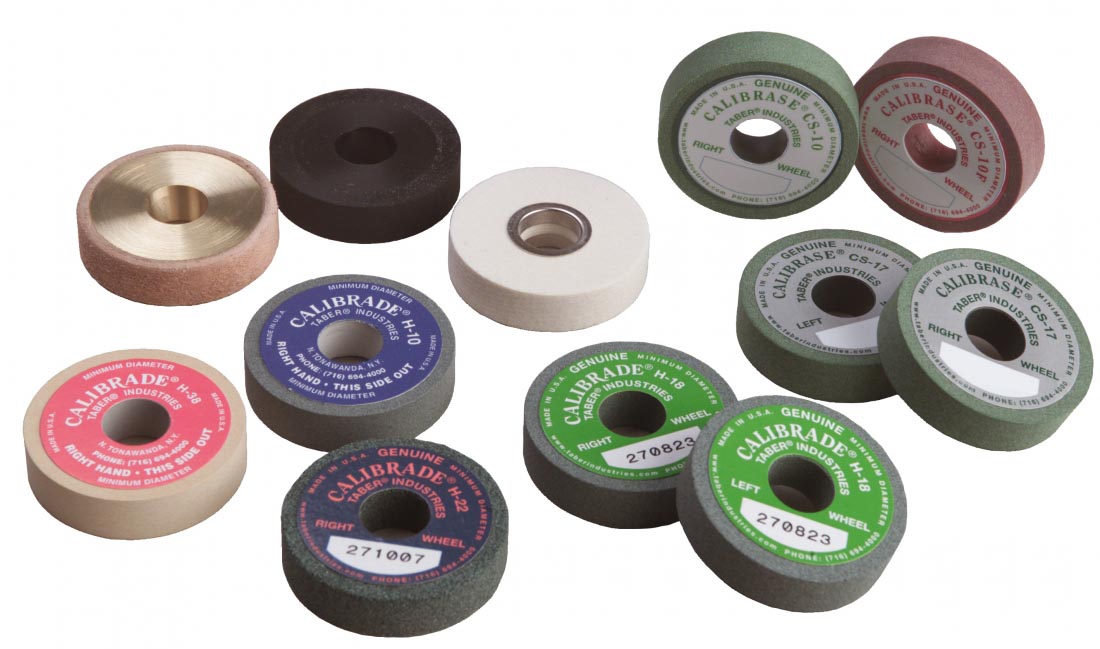
Don’t worry. Please directly inform Amade Sales what product you will use this Taber Tester to test on or what standard you will follow in your test. Our sales specialists will include the right abrading wheels in the quotation for you.
After receiving your inquiry, we will analyze and confirm the type of consumables to be matched. The consumables are already included in our quotation, so you don’t need to buy additional consumables, including the vacuum cleaner, which is also a free gift together with the machine. You can purchase from AMADE with confidence. There are no hidden extra costs.
In the future, if your consumables are used up and you want to buy new consumables, you can contact AMADE to buy them at any time.
Disk Area Requirements:
The size of the specimen is related to the material. For most hard-made specimens, the specimen size can be a square with a side length of 100 mm (4.0 inches). For soft specimens, the specimen should be round and use a sample holder. If a sample pad is used, the diameter of the sample should be 108 mm (4.25 inches). If the sample pad is not used, the diameter of the sample should be 135 mm (5.25 inches) so that the sample fixing ring can clamp the edge of the specimen.
If the specimen is smaller than the recommended size, you can put 2 to 3 samples on the specimen pad to meet the needs of the test. If the edges of the sample cannot butt or the thickness of the sample is different, the abrasion test results reflected on the edges will be different from the results of other parts of the sample.
Thickness requirements:
The standard thickness is 6.35 mm (0.25 inches). For samples with a thickness of more than 6.35 mm (0.25 inches) and less than 12.7 mm (0.5 inches), the S-21 riser nut needs to be adjusted. Thickness exceeding 12.7 mm (0.5 inches) requires the use of an abrasion bracket arm raising device.
Of course. Our standard accessories include a pair of 250g weights, a pair of 500g weights and a pair of 750g weights. However, if your test does not use some of these weights, we can provide you with only one or two of them. For example, if you don’t need 250 and 500g weights, we can only configure 6 pcs of 500g weights for you, without extra cost.
No matter what your personalized requirements, please tell the AMADE salesperson directly, we will do our best to meet your requirements.
- Check and ensure that the Taber abrasion testing machine and all necessary accessories, including vacuum cleaner, specimen, weights, abrading wheels, wrench, brush, etc., are in place.
- According to the specimen, please choose the right abrasive wheels, attach them to the pivoted arms, and tighten the knurled nuts to ensure that both are secured. Please note that there are resilient abrading wheels and vitrified abrading wheels. To achieve consistency of the test, the resilient wheels have to be refaced using a resurfacing disc(S-11) or sandpaper before every test and at intervals. For more details, refer to the specification in the standard cited. The vitrified abrading wheels don’t need this process.
- Weigh the specimen before being rubbed, and screw off bolts and take down the clamp ring from the specimen holder, then place the test specimen on the turntable in place (circular backing cardboard or a solid board equivalent to it is necessary to be padded beneath the specimen If the test piece is soft fabric), then screw up the bolts to fix the specimen.
- Lower the two grinding heads slowly and carefully until the wheels rest on the specimen, then check whether it needs to add loading weight based on different standards (weights of 250 g, 500 g & 750 g are available).
- Put down the ledge with vacuum pickup nozzles, adjust the position and vertical height above the surface of the test pieces according to the specification, and connect the vacuum machine to the Taber abrader, start the vacuum, and adjust the pressure to an appropriate value.
- Set the number of specimen revolutions and abrading speed, press the test button to start the machine.
- The machine will stop automatically once reaching the set number of cycles. You can brush the test piece and weigh it again to calculate the test result based on the specific method in the standard.
Please note: The above is a generic instruction for your reference. More test procedures in detail must follow the specific Taber abrasion test standards referenced.
- The machine must be placed on a level table before use.
- It is not allowed to move the machine during use.
- Select the corresponding power supply and voltage, do not use over-high voltage to avoid burning the device.
- When the instrument is abnormal, please contact our company for timely handling.
- Please pay attention to check the machine at regular intervals and add the proper amount of lubricating oil for some mechanical components If necessary.
- After each test, clean the machine and keep the machine clean.
- The control part must be wiped with a dry cloth, not a wet cloth.
If you want to learn more about the product, please feel free to contact AMADE Sales Staff.
- The ordering procedure is too simple. First, leave your inquiry directly in “Send an Inquiry” on this page or find the sales email in “Contact Us” page to contact AMADE’s sales department directly. Under normal circumstances, you will get a reply from Amade Salesperson within 12 hours. PLEASE NOTE: Kindly write your test object or test standard in the inquiry, which is very important. If you do not write it clearly, the sales staff will not know what abrading wheel and sandpaper to configure for you when quoting. Moreover, if you have other special requirements for transportation or other aspects, please try to tell us the details in your inquiry, so that we can provide accurate quotation and service for you.
- AMADE sales staff will make a complete quotation as soon as possible and send it to the mailbox left by you. This quotation will contain the product price, parameters, detailed introduction, payment terms, shipping terms, lead time, etc., information.
- After you and the salesperson agree on various conditions, the sales staff will make a PI for you to arrange the advance payment. When the advance payment is received, AMADE production department will be informed to start production. During the preparation of the goods, the sales staff will update the production progress in real-time to you. After production is completed within the specified delivery period, AMADE will arrange delivery immediately after receiving the balance payment. After you receive the goods, the after-sales personnel of AMADE will guide and help the use of the equipment and provide life-long technical support for the product.
How to Pack the Machine?
We use the special non-fumigation export wooden case to pack the products (refer to the right picture). The machine in the case is surrounded with foam to protect the machine from bumping and damage during transportation.
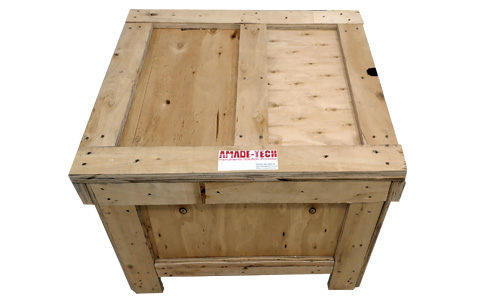
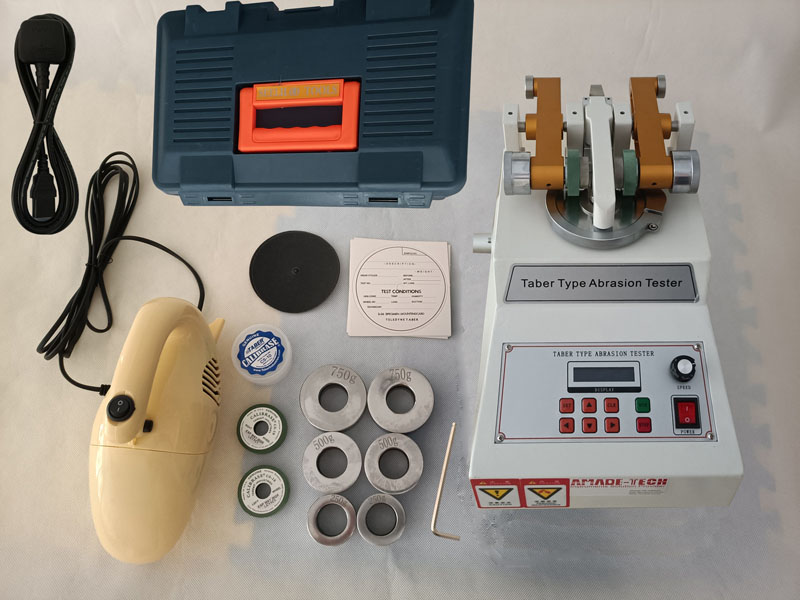
What Details Are Contained in the Case?
Take a single platform Taber abraser as an example, the items placed in the wooden box are as follows( Please refer to the left picture):
Taber Abraser 1 set
Vacuum cleaner 1 set
250 g Weight 2 pcs
500 g Weight 2 pcs
750 g Weight 2 pcs
Abrading wheel CS-10 or CS-17 1 pair or Specified
S-11 Sandpaper 5 pcs
Paster 3 pcs
Power line 1 pc
Hex wrench 1 pc
Yes, it is ready to use once you receive the goods.
Because before shipment, our technicians have completed the installation, debugging and calibration of the machine. When the user receives the goods, he/she only needs to plug in the power supply to start working in the laboratory. We will provide users with professional operating instructions to help them use our products. If users have any questions during use, they can contact us at any time. AMADE’s after-sales staff will help users solve problems in various ways at all times. We promise to provide lifetime technical support for all products sold by AMADE.
Others Also Viewed
Send an Inquiry
Please feel free to contact us for more details on the product, price, lead time, payment terms, shipment methods, etc. Amadetech sales specialists will respond within one working day.


